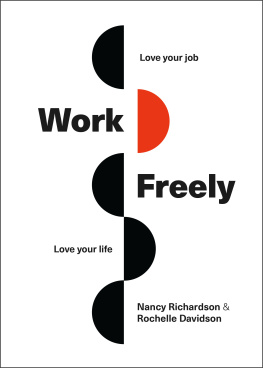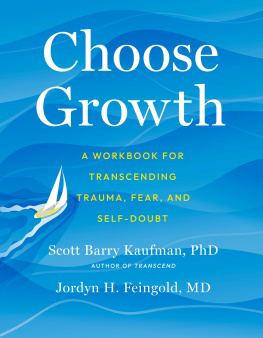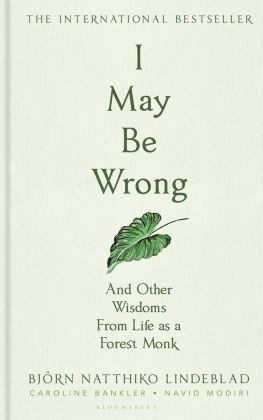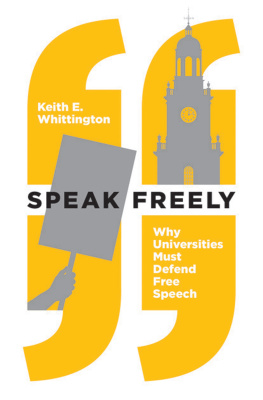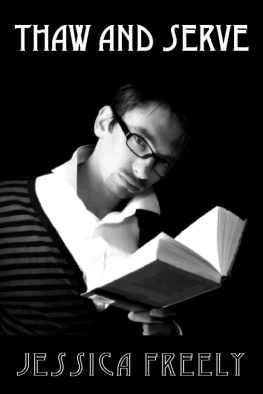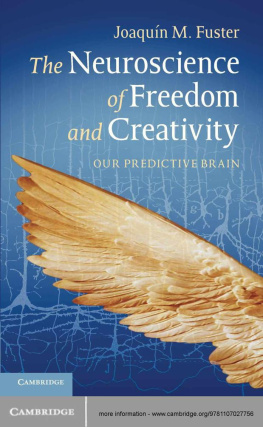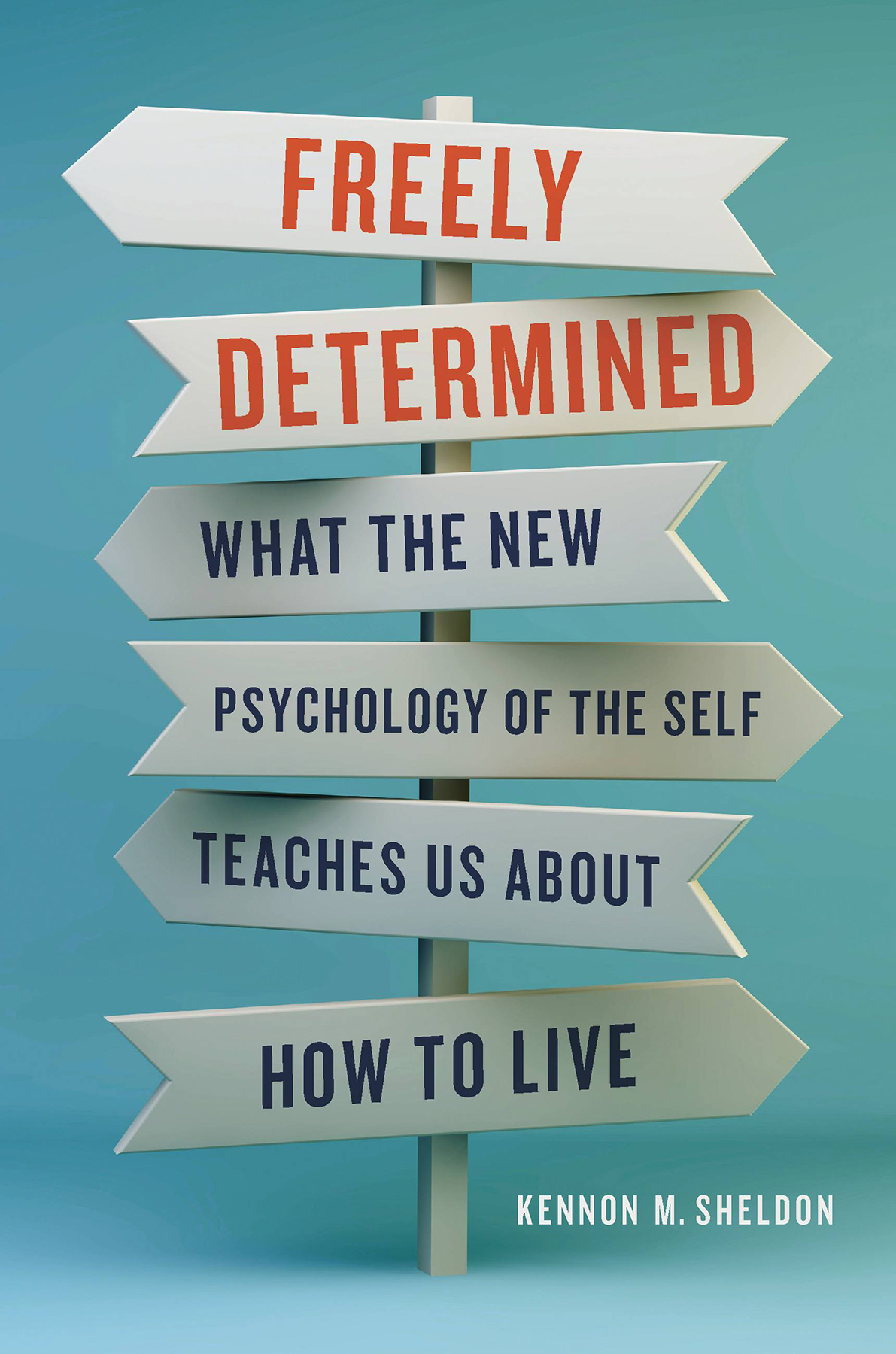
Copyright 2022 by Kennon M. Sheldon
Cover design by Chin-Yee Lai
Cover image McLittle Stock / Shutterstock.com
Cover copyright 2022 by Hachette Book Group, Inc.
Hachette Book Group supports the right to free expression and the value of copyright. The purpose of copyright is to encourage writers and artists to produce the creative works that enrich our culture.
The scanning, uploading, and distribution of this book without permission is a theft of the authors intellectual property. If you would like permission to use material from the book (other than for review purposes), please contact permissions@hbgusa.com. Thank you for your support of the authors rights.
Basic Books
Hachette Book Group
1290 Avenue of the Americas, New York, NY 10104
www.basicbooks.com
First Edition: October 2022
Published by Basic Books, an imprint of Perseus Books, LLC, a subsidiary of Hachette Book Group, Inc. The Basic Books name and logo is a trademark of the Hachette Book Group.
The Hachette Speakers Bureau provides a wide range of authors for speaking events. To find out more, go to www.hachettespeakersbureau.com or call (866) 376-6591.
The publisher is not responsible for websites (or their content) that are not owned by the publisher.
Library of Congress Cataloging-in-Publication Data
Names: Sheldon, Kennon M. (Kennon Marshall), author.
Title: Freely determined : what the new psychology of the self teaches us about how to live / Kennon M. Sheldon.
Description: First edition. | New York : Basic Books, 2022. | Includes bibliographical references and index.
Identifiers: LCCN 2022006150 | ISBN 9781541620360 (hardcover) | ISBN 9781541620377 (ebook)
Subjects: LCSH: Free will and determinism. | Psychology.
Classification: LCC BF620 .S44 2022 | DDC 123/.5dc23/eng/20220624
LC record available at https://lccn.loc.gov/2022006150
ISBNs: 9781541620360 (hardcover), 9781541620377 (ebook)
E3-20220817-JV-NF-ORI
To my father, John Donaldson, who started me o n this curious pa th.
Mans main task in life is to give birth to himself, to become what he potentially is. The most important product of his effort is his own personality.
Erich Fromm, Man for Himself (1947)
When I was a teenager, my father and I used to argue about the existence of free will. My father, a staunch determinist, was convinced it was a myth. Our behavior might be caused by many factors, he saidgenetics, environment, past conditioningbut human striving is not one of them. Not only do our choices not matter, they arent even choices at all.
Our conversations took a similar path each time the subject arose. My father would repeat two simple questions. First he would ask, Are there any uncaused causes? In other words, are there any events that were not themselves caused by prior events? The answer had to be no. I picked up the coffee cup because of an unconscious habit, or because of my addiction to caffeine. My sense that I was the one choosing was merely a side effect of those prior causes, just as smoke is only a side effect of fire.
For his second question, my father would ask, Does the present always follow the past? I would have to agree that it did. Then, he would conclude, how could a persons feeling of causing their own behavior in the present be correct? The present can only be what the past allows it to be, not what we want it to be.
My dads arguments had definite intellectual appeal. They seemed to derive from logic, and from a scientific worldview that I strongly valued and believed in. In science, when objective facts contradict your subjective beliefs, then you need to change your beliefs. No wishful thinking allowedbetter to be wrong than ignorant.
Still, my whole life, I have been haunted and hounded by the question of free will. Does an objective attitude really require us to deny all power to subjective intentions, to the sense that we are making choices in the world? Or can it be scientifically legitimate to conclude that a carefully thought out personal decision made a large difference in a persons life? These tensions have inspired a great deal of my research as a psychologistthey helped steer me toward the field of psychology in the first place.
Like me, you may also have trouble accepting determinism, at least the hard versions, which say that human consciousness is only a hallucination, and our ability to choose our own destiny a delusion. You feel more or less in charge of your life. Every day, you make decisions, from which shirt to wear in the morning to whether to pursue a particular job or relationship. You recognize that there are constraints on your choices, of courseyou wouldnt wear a heavy coat on an eighty-degree day, or a pair of swim trunks to the office. And you know that just because you choose to go after something doesnt mean youll get it. You may even realize, immediately or later on, that you made a wrong choice. Still, you are the one deciding, for better or worse. It might feel so obvious that youre tempted to see the whole free-will debate as pointless and irrelevant. What difference does it even make?
But if we dig a little deeper, free will gets more interestingand we begin to see how crucial it is to who we are. If the determinist perspective is correct, for example, then our belief that we are making our own choices must be delusional. You might think that you started reading this book because thats what you decided to do today. But perhaps another factor, or combination of factors, is really at work: the firing of specific neurons, the release of certain neurochemicals, your past conditioning, your needy emotional state, your current course assignment, or the repeated insistence of a friend. In that case, the feeling that you caused yourself to start reading this book may simply be a comforting fairy tale, a mistaken attribution that allows you to maintain a sense that you are in control, but that ultimately holds you back. This is what hard determinists insist. Most of them put our belief in free will (including yours , dear reader!) into the same category as belief in telepathy and clairvoyance, in crystal healing or reincarnation, or in ghosts, spirits, and gods. They think youd be better off if you could get over it.
As a research psychologist, I am just as skeptical as any other scientist about clairvoyance, reincarnation, deities, and the like. But my research has led me to suspect that the deterministic view of self-determination (namely, that there is no such thing) might just be wrong. Not only might we have free will, we might have radical , even inescapable free willmeaning that we cant help but make choices, on a daily and even moment-to-moment basis. That is what our minds evolved to do. And these choices can have a profound effect on the course of our liveseven when, at first glance, they appear very simple or minor.

Meet Tony, a college basketball player at a well-regarded state university. Tony is the best player on his team, and he hopes to be able to play professionally after graduationhe imagines himself in the NBA, with all the money and attention that would entail. Tonys teammates know he has this ambition, as does his coach. Unfortunately, Tonys team has played below expectations this season, and is in danger of being left out of the upcoming national championship tournament.


